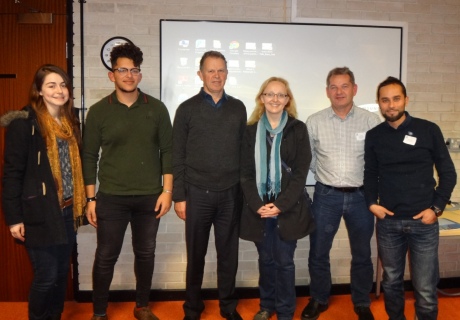Imperial undergrad merits award for muscle research
by Ben Campion

Ahmed Elgharably presenting at the Cryo Microscopy Group meeting in Birmingham, November 2015.
An Imperial undergraduate has won special merit for his research on muscle sarcomere in a pitching competition aimed at researchers far his senior.
Imperial undergraduate and aspiring doctor Ahmed Elgharably has received a special merit award from the Cryo Microscopy Group for a presentation on muscle sarcomere in a pitching competition aimed at PhD-level young researchers.
Ahmed presented his findings to the Cryo Microscopy Group’s November meeting in Birmingham in its ‘Freeze Frames’ competition, which gives researchers just two minutes and two slides to give the audience an overview of their work.
The competition serves to foster interest in low temperature approaches to microscopy and analysis, and is aimed at postgraduate students—“but I felt it would be a lost opportunity if I didn't present my work,” Ahmed explains.
A sarcomere is the unit which makes up a myofibril in muscle tissue. Ahmed’s research looks at the ‘H-zone’ which presents as either a sharp edge or a fuzzy line in different muscle sarcomeres analysed. His project questions whether the definition of the H-band correlates to that of the myosin binding protein C stripes.
“The idea behind this research is to learn more about the structure and role of myosin binding protein C which at the moment is poorly understood,” explains Ahmed.
“It is important as mutations in myosin binding protein C lead to the disease hypertrophic cardiomyopathy, which affects 1 in 500 people. It causes a very thick heart muscle which is ineffective in pumping blood around the body.
“This can then lead to sudden heart attacks, particularly when the sufferer is exerting strenuous load on the heart such as through intense exercise.”

Ahmed Elgharably with the other Cryo Microscopy Group competition winners
Gap-year programme
Ahmed is a gap-year student who is currently on placement with Dr Pradeep Luther in the molecular medicine section of the National Heart and Lung Institute (NHLI) at Imperial. After that he will go on an extended placement in Singapore.
“I am loving every part of this gap-year scheme at the moment,” he says. “I have met amazing people here at Imperial from both living in the new Woodward Buildings—another benefit of the scheme—to people in my research department.
“During my time in the NHLI, I have also produced an A0 poster which I presented at Hammersmith Hospital,” he says. “It has been an invaluable experience in terms of realising and understanding what medical research is all about.
“I have developed my presentations skills, I have learnt invaluable lab skills and practical skills, including how to use an electron microscope, and I have been contributing to developing our scientific understanding.”
Placement in Singapore
Ahmed’s work at the NHLI in London is preparing him for a six-month research placement with Professor Mike Ferenczi at Lee Kong Chian School of Medicine in Singapore. LKCMedicine opened in 2013 as a collaboration between Imperial and Singapore’s Nanyang Technological University, and now has 222 students.
“In Singapore I will be using induced pluripotent stem cells and manufacturing them into cardiomyocytes and then testing them under different chemical conditions,” he explains.
“The experience provided by this opportunity from Imperial and LKCMedicine is extremely exciting. It puts me at the forefront of research and discovery and allows me an insight into medical research.
“I will be able to explore south-east Asia, I will be able to work with leading professionals in the field of cardiac research, I will learn the practical skills of being able to use and manipulate stem cells, and I will develop my knowledge of medicine and of different cultures—what an amazing deal!”
Aspiring doctor
Returning from Singapore, Ahmed will join first-year medicine at Imperial in October 2016. So far he’s had experience of A&E, ophthalmology and general practice, and was most drawn to the fast-paced and ever-changing nature of the emergency department—but hasn’t yet decided what speciality to pursue.
“I have always wanted to study medicine as it is the best balance between science and people. It gives me the opportunity to apply scientific principles and scientific research practically and improve the lives of people on a day-to-day basis.
“Part of this is doing the research itself, which I always thought I would only be able to do much later in my medical career. But to be introduced to this opportunity right at the start is something that I can only see as a spring board.
“This experience has been unparalleled by any other and is very difficult to find. I feel very lucky and blessed to have been accepted into Imperial and this research gap-year scheme.”
Article text (excluding photos or graphics) © Imperial College London.
Photos and graphics subject to third party copyright used with permission or © Imperial College London.
Reporter
Ben Campion
Faculty of Medicine Centre